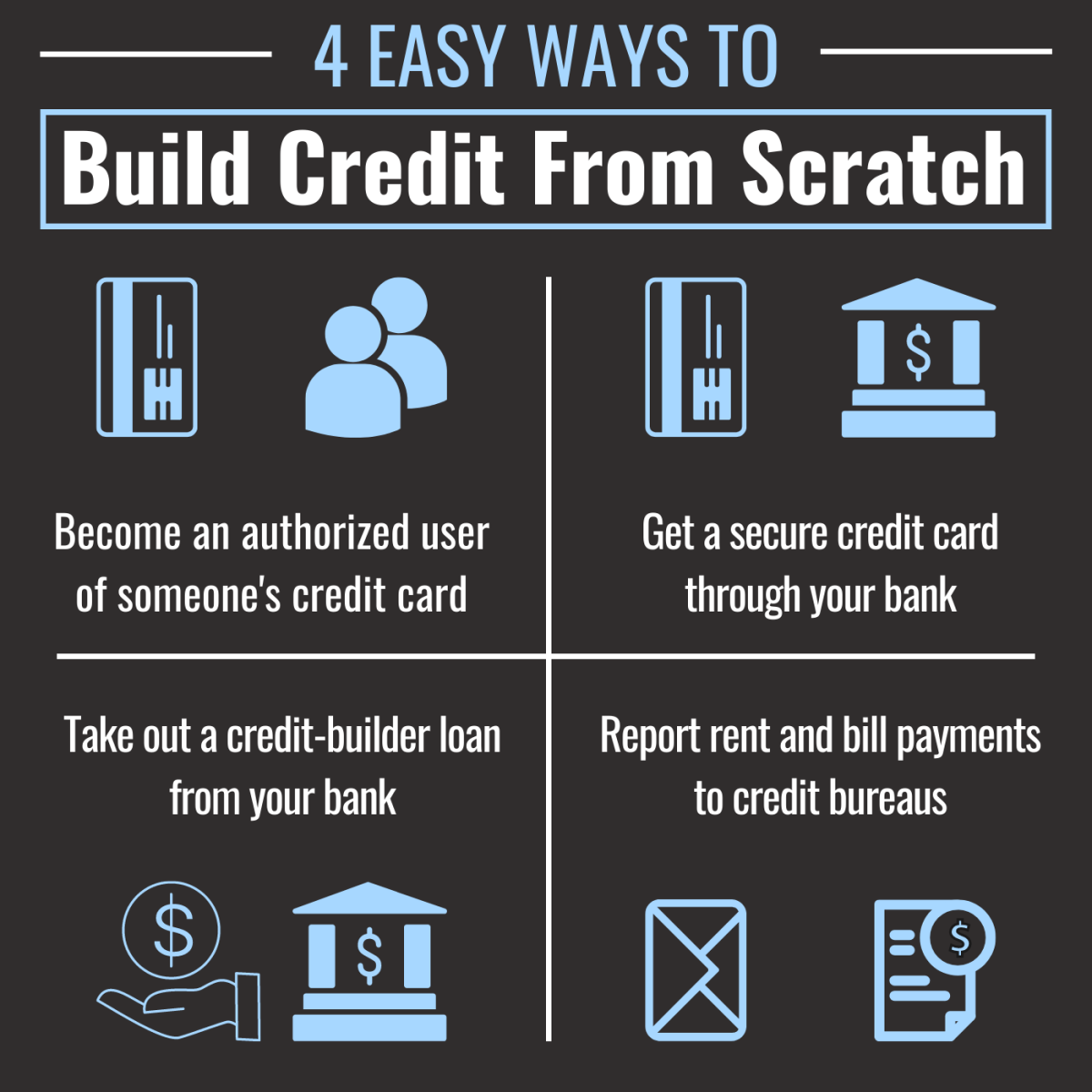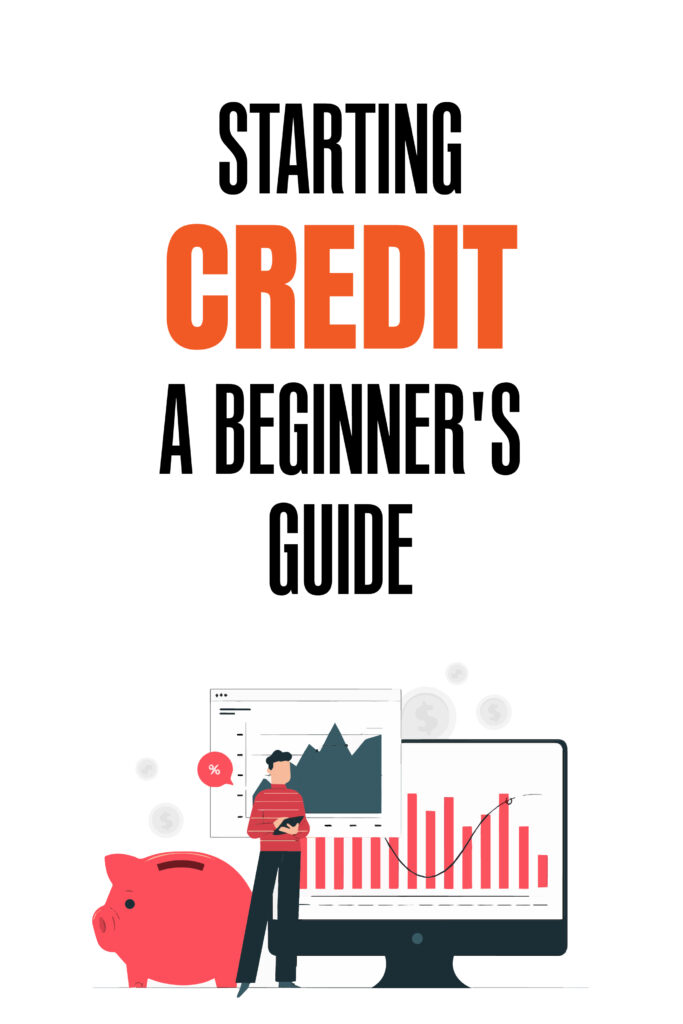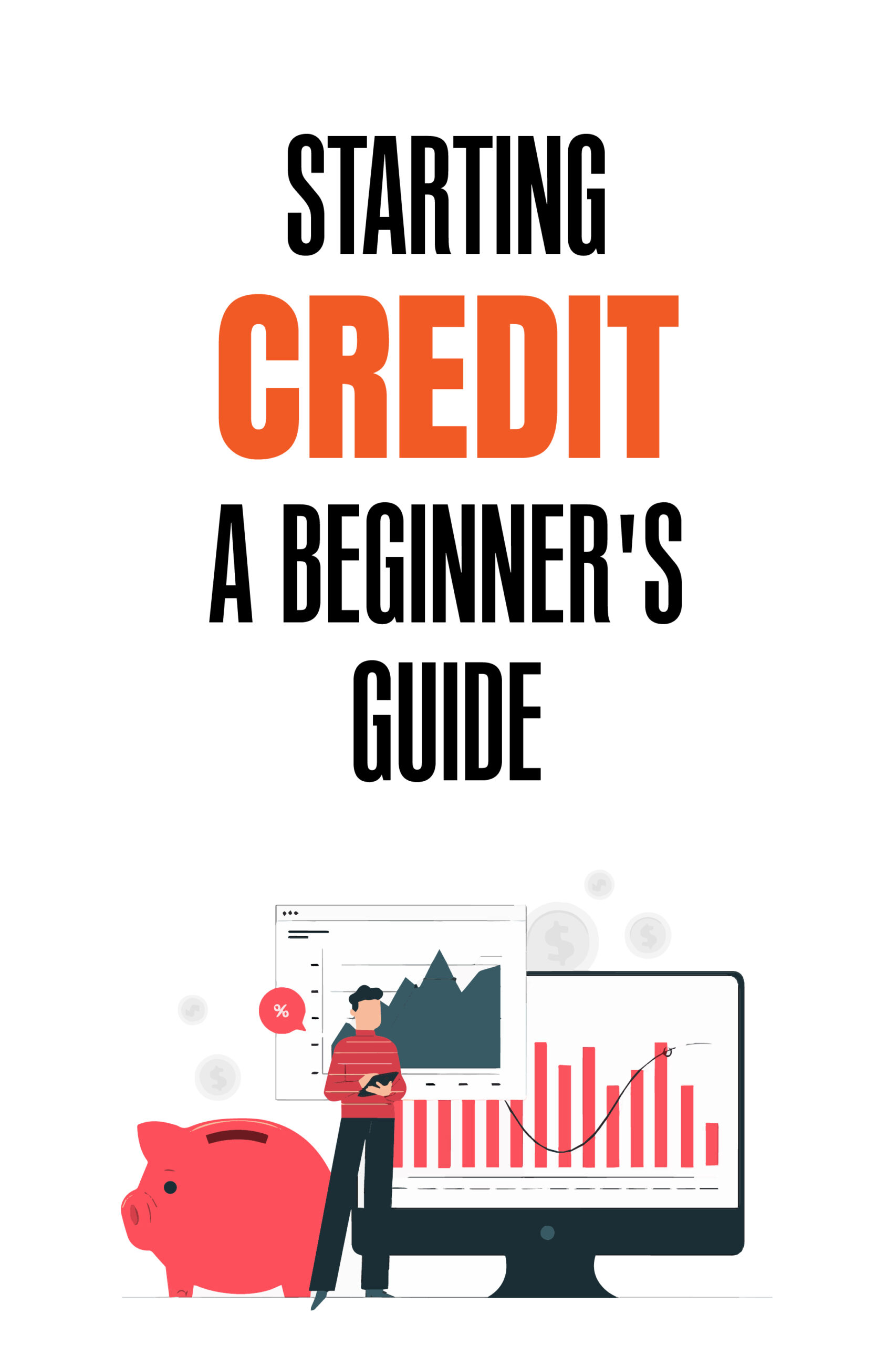Start building credit from scratch by obtaining a secured credit card and paying bills on time. These steps establish a positive credit history.
Building credit from scratch can seem challenging, but it’s achievable with the right approach. Begin by applying for a secured credit card, where you deposit a sum as collateral. Use this card responsibly, ensuring you pay off the balance in full each month.
Timely payments are crucial as they reflect positively on your credit report. Additionally, consider becoming an authorized user on someone else’s credit card to benefit from their good credit history. Regularly monitoring your credit score and report helps you track progress and address any discrepancies promptly. These actions lay a solid foundation for a strong credit profile.

Credit: www.thestreet.com
Introduction To Credit
Starting your credit journey can feel overwhelming. Understanding credit basics is crucial. This guide helps you build a strong foundation.
Importance Of Credit
Credit is vital for many financial decisions. It affects loan approvals, rental agreements, and job opportunities. Good credit can save you money.
Here are some key reasons why credit is important:
- Loan Approvals: Good credit increases loan approval chances.
- Lower Interest Rates: Strong credit scores get lower interest rates.
- Rental Agreements: Landlords check credit scores before renting.
- Employment: Employers sometimes review credit reports for jobs.
Credit Score Basics
A credit score is a three-digit number. It reflects your creditworthiness. Higher scores mean better credit.
Credit scores range from 300 to 850. Here is a breakdown:
| Score Range | Rating |
|---|---|
| 300-579 | Poor |
| 580-669 | Fair |
| 670-739 | Good |
| 740-799 | Very Good |
| 800-850 | Excellent |
Several factors impact your credit score:
- Payment History: Timely payments boost your score.
- Credit Utilization: Keep credit usage below 30%.
- Credit History Length: Longer history helps your score.
- New Credit: Frequent applications can lower your score.
- Credit Mix: Different types of credit improve your score.
Starting Without Credit History
Building credit from scratch can seem tough. But it’s an important journey. Let’s explore why having a credit history matters and the initial steps to take.
Why It Matters
Having a credit history is crucial. It helps you get loans and better interest rates. Without a credit history, lenders can’t see if you’re trustworthy.
| Benefits of Good Credit | Drawbacks of No Credit |
|---|---|
| Lower interest rates on loans | Higher interest rates |
| Better chance of loan approval | More loan rejections |
| Higher credit limits | Lower credit limits |
Initial Steps
Start by opening a secured credit card. This card uses money you deposit as collateral. Spend wisely and pay on time to build your credit.
Another option is to become an authorized user. Ask a family member to add you to their credit card. Their good credit can help build yours.
Consider getting a credit-builder loan. These loans are designed to help you build credit. You make payments to a savings account, and they report to credit bureaus.
- Open a secured credit card
- Become an authorized user
- Get a credit-builder loan
Secured Credit Cards
Secured credit cards are a powerful tool for building credit. These cards require a security deposit. This deposit serves as collateral. They work just like regular credit cards. But they are easier to get if you have no credit history.
How They Work
Secured credit cards need a cash deposit. This deposit is usually equal to your credit limit. For example, a $200 deposit gives you a $200 limit. You use the card to make purchases. You then pay off the balance each month.
Paying on time helps build your credit score. The card issuer reports your payments to the credit bureaus. This helps establish your credit history.
Choosing The Right Card
Not all secured credit cards are the same. Here are some factors to consider:
- Annual Fees: Some cards have no annual fees. Look for these first.
- Interest Rates: Lower rates save you money if you carry a balance.
- Upgrade Options: Some cards let you upgrade to an unsecured card later.
- Credit Reporting: Ensure the card reports to all three major credit bureaus.
Below is a table to help you compare different secured credit cards:
| Card Name | Annual Fee | Interest Rate | Upgrade Option |
|---|---|---|---|
| Card A | $0 | 15% | Yes |
| Card B | $25 | 20% | No |
| Card C | $35 | 18% | Yes |
Choosing the right secured credit card is important. Make sure to read all terms and conditions.
Becoming An Authorized User

Building credit from scratch can be challenging. One effective way is by becoming an authorized user. This method involves being added to someone else’s credit card account. It allows you to benefit from their good credit habits. This can help you build your credit history quickly.
What It Means
Being an authorized user means you are added to another person’s credit card account. You can use the card but are not responsible for payments. The primary account holder remains responsible for the debt. Your credit report will show the account’s history.
Benefits And Risks
Benefits:
- Helps build credit history.
- No financial responsibility for debt.
- Access to better credit card options.
Risks:
- Negative impact if the primary user misses payments.
- Possible removal by the primary user.
- Limited control over the account.
Using Credit Wisely
Building credit from scratch can be challenging. Using credit wisely is crucial. Smart credit usage can boost your credit score. Below, we cover two key areas to focus on.
Payment Strategies
Paying on time is essential. Late payments harm your credit score. Here are some effective payment strategies:
- Set up automatic payments to avoid missing due dates.
- Pay more than the minimum to reduce debt faster.
- Track your payment dates with a calendar reminder.
Consistent payments build a positive credit history. Even small payments help. Every on-time payment counts.
Keeping Utilization Low
Credit utilization impacts your credit score. High utilization can lower your score. Here’s how to keep it low:
- Use less than 30% of your credit limit.
- Pay off balances before the billing cycle ends.
- Spread purchases across multiple cards.
Use a credit utilization calculator to monitor your usage. Keeping utilization low shows responsible credit behavior.
| Strategy | Action |
|---|---|
| Automatic Payments | Set up through your bank or card issuer |
| Pay More than Minimum | Increase monthly payment amount |
| Use Multiple Cards | Distribute expenses evenly |
By following these strategies, you can build strong credit. Responsible credit use leads to financial freedom.
Monitoring Your Credit
Building credit from scratch takes time and effort. You need to monitor your credit regularly. This helps you understand your credit status and make informed decisions.
Credit Reports
Credit reports show your credit history. They list your debts, payments, and other credit activities. You get credit reports from three major bureaus: Equifax, Experian, and TransUnion.
Check your credit reports for errors. Errors can hurt your credit score. If you find errors, dispute them quickly. Correct information helps your credit score grow.
Free Monitoring Tools
Many tools help you monitor your credit for free. These tools alert you to changes in your credit report. They also provide tips to improve your credit score.
- Credit Karma: Offers free credit scores and reports from TransUnion and Equifax.
- Credit Sesame: Provides a free credit score and monitoring from TransUnion.
- Mint: Tracks your credit score and financial transactions.
Using these tools helps you stay informed. You can quickly spot issues and take action. Monitoring your credit is a key step in building a strong credit history.
Building Credit With Loans
Starting from scratch to build credit can seem difficult. One effective way to build credit is by using loans. Loans help you show creditors that you can manage borrowed money responsibly.
Types Of Loans
Various types of loans can help you build credit. Choosing the right one depends on your needs and financial situation.
| Loan Type | Description |
|---|---|
| Personal Loans | Unsecured loans used for various personal expenses. |
| Student Loans | Loans specifically for education-related expenses. |
| Auto Loans | Secured loans used to purchase a vehicle. |
| Credit Builder Loans | Loans designed to help you build credit. |
Managing Loan Repayments
Managing loan repayments is crucial for building credit. Here are some tips to help you stay on track:
- Always pay on time. Late payments hurt your credit score.
- Set up automatic payments to avoid missing due dates.
- Keep track of your loan statements. Review them regularly for accuracy.
- Pay more than the minimum payment if possible. This reduces your loan balance faster.
Following these tips will help you build a strong credit history. Always stay organized and be mindful of your financial habits.
Common Mistakes To Avoid
Building credit from scratch can be challenging. Avoid common mistakes to improve your credit score. Mistakes can lower your score. This section highlights common pitfalls.
Late Payments
Late payments can severely damage your credit score. Always pay your bills on time. Set reminders or automate payments to avoid missing deadlines.
- Set up automatic payments: Connect your bank account for automatic payments.
- Use calendar reminders: Mark your payment due dates on a calendar.
- Prioritize bills: Pay essential bills first to avoid late fees.
Excessive Inquiries
Applying for too much credit can hurt your score. Each application leaves a hard inquiry on your report. Too many inquiries suggest you might be desperate for credit.
- Space out applications: Wait several months between credit applications.
- Check your credit score: Monitor your score to see the impact of inquiries.
- Research lenders: Know which lenders will likely approve you before applying.
| Action | Impact on Credit Score |
|---|---|
| Late Payment | Significant negative impact |
| Excessive Inquiries | Moderate negative impact |
Long-term Credit Strategies
Building credit from scratch requires a thoughtful approach. Focusing on long-term credit strategies can pave the way for a strong financial future. Below, we explore some essential strategies for maintaining and growing your credit over time.
Diversifying Credit
Diversifying your credit portfolio is crucial. Lenders like to see a mix of credit types. This shows you can manage different forms of debt. Here’s a simple breakdown of credit types:
- Credit Cards: Regular use and timely payments build a good score.
- Installment Loans: Car loans and student loans also help.
- Retail Store Cards: These can be easier to get and help diversify.
Balance these types to show lenders you are a responsible borrower.
Consistent Monitoring
Regularly checking your credit report is essential. This helps identify errors and fraud early. Follow these steps to monitor your credit effectively:
- Get Free Reports: Use annualcreditreport.com for free reports once a year.
- Review Carefully: Check for inaccuracies or suspicious activity.
- Set Alerts: Many banks offer credit monitoring alerts.
Consistent monitoring helps maintain a healthy credit score. It also helps you understand your financial habits better.
By following these strategies, you can build and maintain a strong credit history.

Credit: m.youtube.com
Conclusion And Next Steps
Building credit from scratch can seem challenging. But with the right strategies, it becomes manageable. Let’s wrap up with some actionable steps to help you on your journey.
Setting Goals
Setting clear goals is crucial. It gives you direction and purpose. Start by identifying your credit needs. Do you want to buy a car? Maybe you plan to own a home?
Next, create a timeline. Decide when you want to achieve your goals. Break down your goals into smaller, manageable tasks. This makes the process less daunting and more achievable.
| Goal | Timeline |
|---|---|
| Secure a Credit Card | 3 Months |
| Improve Credit Score | 6 Months |
| Qualify for a Loan | 1 Year |
Staying Informed
Staying informed is essential. Knowledge is power. Regularly check your credit reports. This helps you spot errors and understand your credit behavior.
Use free credit monitoring tools. These tools alert you to changes in your credit report. You can take quick action if something unexpected happens.
- Sign up for credit monitoring services.
- Review your credit report every month.
- Understand factors that affect your credit score.
Read articles and books about credit. Stay updated with the latest tips and tricks. Knowledgeable people make better decisions.
- Learn the basics of credit scoring.
- Understand the impact of different credit actions.
- Stay updated with financial news.
Building credit takes time and effort. With clear goals and staying informed, you can achieve your credit dreams.

Credit: m.youtube.com
Frequently Asked Questions
What Is The Fastest Way To Build Credit From Scratch?
The fastest way to build credit from scratch is by getting a secured credit card. Make small purchases and pay the balance in full each month. Consider becoming an authorized user on a family member’s credit card. Always pay bills on time to establish a positive payment history.
How To Get A 700 Credit Score From Scratch?
Build a 700 credit score from scratch by paying bills on time, using credit responsibly, keeping balances low, avoiding new credit applications, and regularly checking your credit report.
How Do I Start Building Credit From Nothing?
Apply for a secured credit card. Use it responsibly and pay bills on time. Become an authorized user on a trusted account. Apply for a credit-builder loan. Monitor your credit report regularly.
How Does A Beginner Build Credit?
A beginner can build credit by opening a secured credit card, paying bills on time, and keeping credit utilization low.
Conclusion
Building credit from scratch takes time and patience. Follow these steps to establish a solid credit history. Regularly monitor your credit report for errors. Use credit responsibly to maintain a good score. With persistence, you can achieve excellent credit. This foundation will open doors to better financial opportunities.

